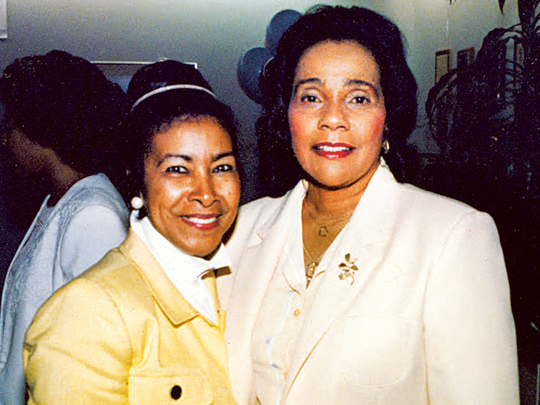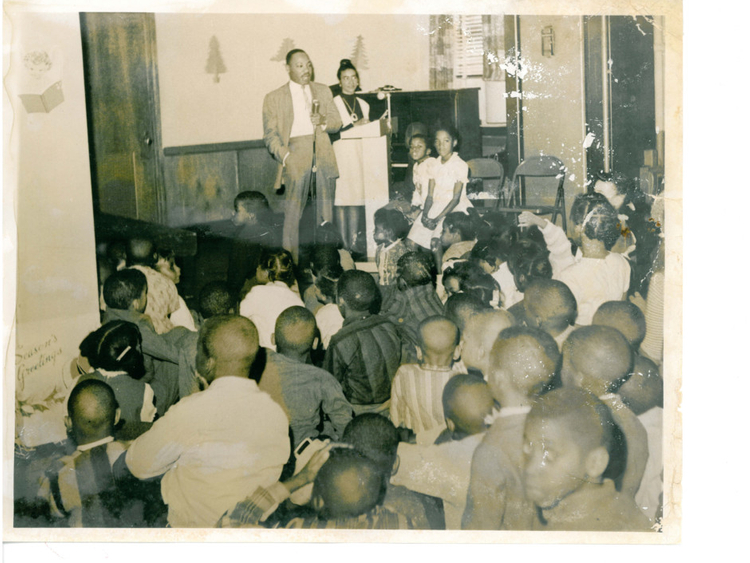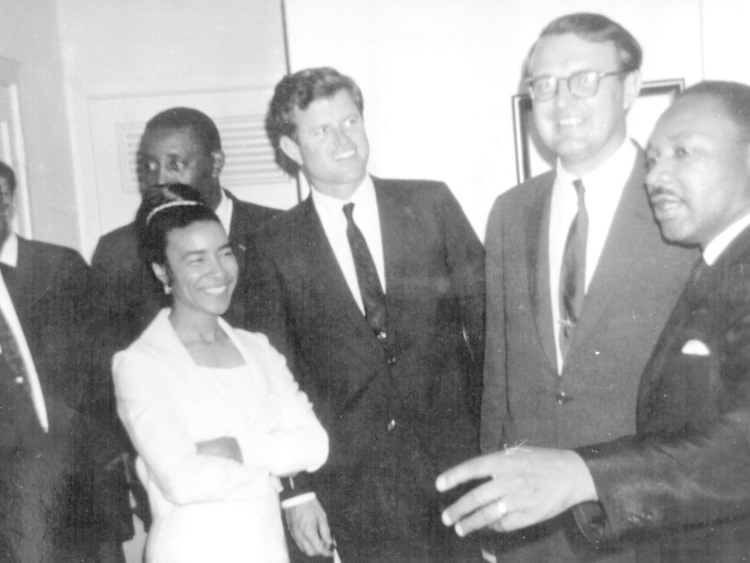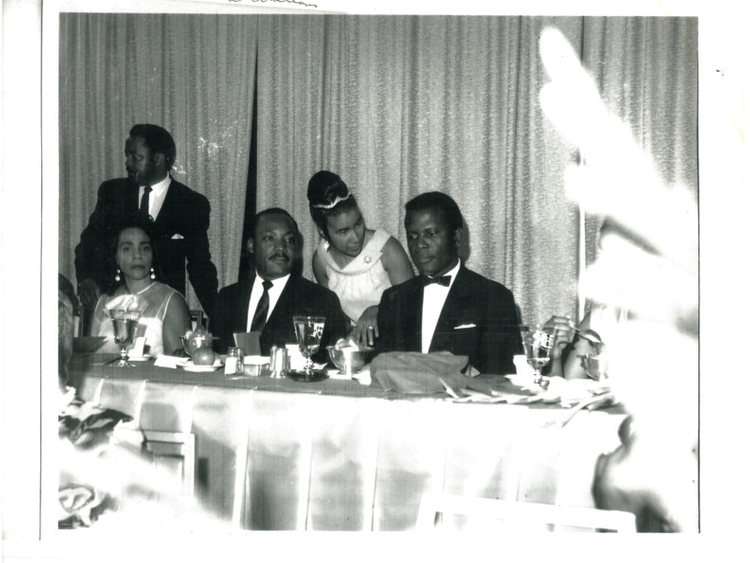
For Xernona Clayton, the current unrest in the US triggered by a spate of black people being shot by white police officers is not unfamiliar.
As someone who fought in the civil rights movement and worked alongside Dr Martin Luther King Jr, these episodic dark political chapters are well known to her.
“This is not new for those of us from another generation. It is unfortunate that we have not been able to curb the mentality of people who treat people different because of race,” Clayton, the civil rights doyenne and broadcaster, told Weekend Review.
Clayton and her late husband Ed worked closely with Dr King and his wife Coretta Scott King in the early 1960s in Atlanta. While Ed, a talented writer with a gift for public relations, helped Dr King get his message across to wider audiences, Clayton lent her event organisation and people skills to the movement.
She has spent her life trying to bring about change and equality through whatever means possible.
To understand why today’s political environment is specially hurtful for her and people of her generation, she spoke with Weekend Review about what was like to be a black person in America in the days when everything was segregated and of the hardships they underwent to make simple changes such as being allowed to sit anywhere in a bus or get a job.
Racism springs :
“Racism has done great harm over the years because of the laws and attitudes of people in America,” said Clayton.
Ugly experience
Her first “overt ugliness experience” was when she was in her early 20s, when she and her friends had an extremely unpleasant experience at the hands of a restaurant owner.
“We stopped at a hamburger place, we all had money, we weren’t going in to burn the place down. We were just going in to get a hamburger. The owner or manager, he had a big butcher’s knife and using the n-word, he said, ‘If you [expletive] don’t get out of here, I am gonna take this knife and cut your heads off. You know you don’t belong here’. There was nothing we could do about it. We got out,” said Clayton. “You never get over that.”
Sixty years on, at the age of 85 now, that evening’s events are as clear to her as the day they happened. The experience created a desire in her to prove she was capable of achieving anything, despite the colour of her skin.
One of her first significant efforts to bring about change was to fight for equal employment opportunities. She teamed up with the Urban League, a civil rights organisation, to investigate and expose discrimination against employment of black people in major companies that portrayed themselves as good and responsible corporate community companies.
Clayton would call the companies about a job that they had advertised, some five minutes away from their location. They would ask her to go in but as soon as they met her, they would tell her the job was no longer available. Urban League reported these incidents and named the companies.
Slowly, these tactics brought about the change they were so desperately fighting for.
“One of my major roles was to open the door for employment. We were helping make the change, that’s a good feeling. Once you feel that you made a difference, you wanted to make a change somewhere else.”
Her involvement with Dr King’s movement began after her marriage to Ed who worked for “Ebony” and “JET” magazines by Johnson publishing, which was a leading black publication in the US at the time.
In the early 1960s, as Ed’s reputation as a brilliant writer grew, he got a call from Dr King to join him in Atlanta to help.
“Coretta was convinced I was the right person for her and Martin was convinced that Ed was the right person to be with him. So after a two and a half hour phone call, they convinced us to move to Atlanta.”
In 1963, the Claytons moved to Atlanta. Xernona joined Dr King’s wife, who was a singer and was performing shows to raise money for the movement, as her travelling companion and assisted her with organising her shows. Ed started newsletters to inform people about what was going on and to get people as well as support Dr King with his speeches, including his famous “I have a dream” speech in Washington DC in 1963.
Getting ready for the march
“We were in Washington DC getting ready for the march. Ed would type it and Martin would go through it and scratch it and say, ‘Take this out and put this in, edit this. I like this but I prefer not to have this’.”
To this day, she has kept copies of the drafts of the speeches her husband worked on.
She recalls other events such as a visit by Ted Kennedy for a Southern Christian Leadership Conference (SCLC) in Jackson Mississippi. She said as they picked Kennedy up from the airport, on their way to the event, “ugly people” had placed nails on the road as their way of objecting to him meeting with Dr King.
Another significant event that Clayton recalls was the Montgomery bus boycott, which although she was not a part of, she and others watched closely from around the country.
In 1955, buses were segregated in the US, a black woman in Montgomery Alabama by the name of Rosa Parks refused to give up her seat in the black section of the bus to a white person, as she was required to do so by law. She was attacked, thrown in jail and fined.
The NAACP (National Association for the Advancement of Coloured People) under the leadership of Dr King called on black people to not use the buses in Montgomery. The boycott lasted more than a year and ended with the removal of segregation from buses as a result of the financial troubles the bus company faced when it lost business from black people.
“They might have not been happy about it but the change happened ... The Montgomery bus boycott is probably one of the best examples of unity and success. And it has never really got a proper recognition.”
She said the decision to boycott is “easier said than done” but everyone came together. “They formed car pools and people volunteered. People stayed on Broadway and someone would pick you up. It was a beautiful picture, because of the unity.”
She said the housemaids were even picked up by their white employers as they lived too far. “[A] gorgeous example of how when you come together and unify, you can make the change. Martin was very methodical, he was very gifted in leadership.”
The Montgomery bus boycott was also the event that established Dr King as a leader.
For nearly three years, the four were almost inseparable, working to break down barriers that kept America segregated. The working relationship ended not long after Ed’s untimely death in 1965 but Xernona remained close friends with the Kings.
Clayton returned to Dr King’s side when he was assassinated. This time, she found herself applying makeup to his face trying to cover up the evidence of the wound before the public viewing.
She says it is unfortunate that despite all her generation’s hardship and hard work, they have not been able to root out racism [in the US]. “Problems of police brutality are now resurfacing, which makes it feel like the same thing is happening again.”
Change of heart
She often quotes Dr King when explaining her points, testimony to the time they spent together and her belief in his vision.
“We haven’t been able to change the hearts of everybody. Dr King used to love to say, and I used to love to hear him say this, that until you change a man’s heart it is difficult to change his behaviour. Once you change his heart, then it is easy to curb his behaviour. We have not been able to change everyone’ hearts.
"Here is a man who has the embedded feeling of separation, white superiority, and he has a gun, he’s got the law on his side and he can express his hostility. That’s what happens with the shootings, that’s my take on it.”
“Until we infuse in the police departments of our country that we’ve got to treat people the same way you would want to be treated, we have a problem that is going to be continuing. That’s the number one problem and it is not an easy problem to solve,” Clayton adds.
She said the police brutalities towards black people have made the African-Americans in society feel that they are being picked on. “The shootings are real, they are factual. You feel like you are still persecuted. When will this end?”
She thinks lack of leadership has led the way for the racial problems to continue and until someone steps up to lead people, she does not see how black people’s voices can be heard at the right level. “We have lost our voice. People say, ‘I wish we had another Martin Luther King’. Suppose Martin Luther King had said that [for himself]? Suppose he [too] was waiting for somebody?”
If everyone waits for the other to lead, where would that end up, she wonders. “What about you [leading]?”
Clayton feels the recent country-wide protests have not been successful because of their lack of planning.
“Unfortunately, it is not planned. They [young people] saw the marches work with my generation, when they produced results and they think that’s the way to solve it. But the difference is, Dr King never went to the street without a plan.”
She condemns the cases of shooting police officers, burning down parts of the cities as they did after the Michael Brown shooting in Ferguson and violent encounters with authorities.
“Martin Luther King was not violent. We disturbed the comfort but we didn’t destroy the environment. We did no burning. We did not beat the police up. We weeded out people who had anger that was wrapped up in violence. We were angry but not violent.”
White people included
Clayton cites Stokey Carmichael’s exclusion from Dr King’s movement. Carmichael was a young leader in the 1960s who did not want to have white people involved in the civil rights activities.
“Dr King said [to Carmichael], ‘I can’t use you in my movement, I cannot hate white people, we need all people to join hands and fight the evils and the ills of our society’.”
Clayton said she understands people’s anger but she believes that emotions have to be kept in check. “Dr King used to say, ‘Don’t march with your hostility’. You can’t fight with anger, you have to have a clear head to fight. Emotions never solve problems.”
Today, Clayton is showing no signs of slowing down. She still turns up to work at 4am, puts in a full day’s work and is a prominent figure on the issues surrounding racism in America.
The first black woman to have her own TV show in the South, she also founded the Trumpet Awards, which recognises contributions of African-Americans.















